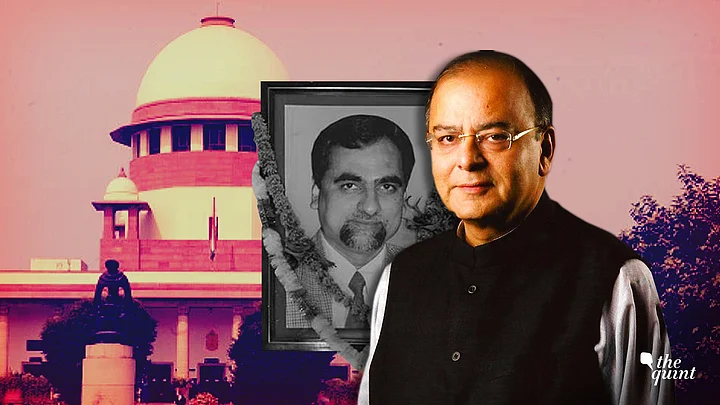Finance Minister Arun Jaitley has published certain comments in response to the Supreme Court’s dismissal of the petitions requesting an independent investigation into the death of Judge Loya, as well as the motion to impeach Chief Justice of India Dipak Misra.
I would humbly like to submit 16 questions in response to the points raised by him, under each of the headings used by him, which are as follows:
Alleged Role of Amit Shah in the Sohrabuddin Case
If the evidence against Amit Shah in the Sohrabuddin Sheikh encounter case was so flimsy that “any court would have discharged” him, then why did the Supreme Court, when passing its judgment of 27 September 2012, hold that proper adjudication of the submissions on both sides needed to be done at trial (para 29)? Further, when considering the issue of cancelling bail, why did the Supreme Court say then that “the apprehension expressed by the CBI that Amitbhai Shah may misuse the freedom and try to subvert the prosecution cannot be lightly brushed aside” (para 30)?
Since you mention the testimony of the Patel brothers, do you not find any contradiction in Judge Gosavi’s observations regarding their testimony while discharging Amit Shah? On the one hand, he dismissed the three statements by each of the Patel brothers because they were exactly the same, but also said improvements were made on them.
The Caravan Magazine’s Fake News
Leaving aside the merits of the Judge Loya case, do you think the Supreme Court could arrive at a definitive conclusion on whether a person’s death was from natural causes or not, without the recording of evidence in the form of affidavits, statements on oath, cross-examination of witnesses etc?
Do you agree that the statements of the four district judges to the Maharashtra ‘discreet inquiry’ did not need to be recorded as affidavits because of concerns over the petitioner’s bona fides?
Is it legally established to give statements of judicial officers not made in their official capacity more weight than statements of other citizens?
What specific falsehoods do you find in The Caravan’s story of 20 November 2017 that raised questions about the issue, apart from the mode of travel to Dande Hospital?
If the statements of the judges are to be given preference over others, what about the statement of Judge Rathi, who said that no ECG was conducted at Dande Hospital (with the specific mention of nodes of the machine), which contradicts the statements of other judges?
The “Institution Disruptors”
Would you like to name the lawyers you have termed “Institution Disruptors”? Why have you not named them if their motives are so clearly mala fide?
You note that the “Institution Disruptors” pick up “false causes”. But why is the Judge Loya case an example of this, when the only request was for an independent investigation into the case?
Do you agree with the Supreme Court’s decision to take into account the bona fides of the petitioners when deciding the Judge Loya case, despite a statement by Chief Justice of India Dipak Misra on 19 February 2018 during proceedings that the Court would not, in fact, be concerned with the petitioners’ bona fides?
The Impeachment Weapon
Article 124(4) of the Constitution and the Judges (Inquiry) Act 1968 use the phrase “proven misbehaviour” rather than “proven misconduct”. Don’t they?
Further, isn’t the proof of misbehaviour or incapacity to be presented to Parliament after the investigation under the Judges (Inquiry) Act 1968, which comes after moving a motion to impeach, rather than before moving it as you suggest?
You note that the charges read out are issues which have been settled by judicial orders or precedent. Can we have reference to judicial orders or precedents in relation to each of the five charges mentioned in the motion – in particular Charge 3 (ante-dating of the note) and Charge 4 (delay in returning land wrongly allocated)?
A Divided Court
Which comment on the Judge Loya case do you refer to when you say that the four senior judges should have checked before making comments about the case? Wasn’t the only mention of the Judge Loya case on that day a single response of “Yes” from Justice Gogoi as to whether or not the judges considered the assignment of that case an example of assignments they were concerned about?
Do your reservations about the Judge Loya case mean that you disagree with all points raised by the four judges in the Press Conference, even though the letter setting out their concerns that was released that day was written a few months prior to the Press Conference, and makes no reference to the Judge Loya case?
You note that the judges should have checked the facts of the Judge Loya case before commenting on it – given that their concerns related to the listing of the case and not its merits. What factual aspects of the case should they have referred to – and from where, since the findings of the discreet inquiry weren’t made available to them or the public at the time?
(The Quint is now on WhatsApp. To receive handpicked stories on topics you care about, subscribe to our WhatsApp services. Just go to TheQuint.com/WhatsApp and hit send.)
